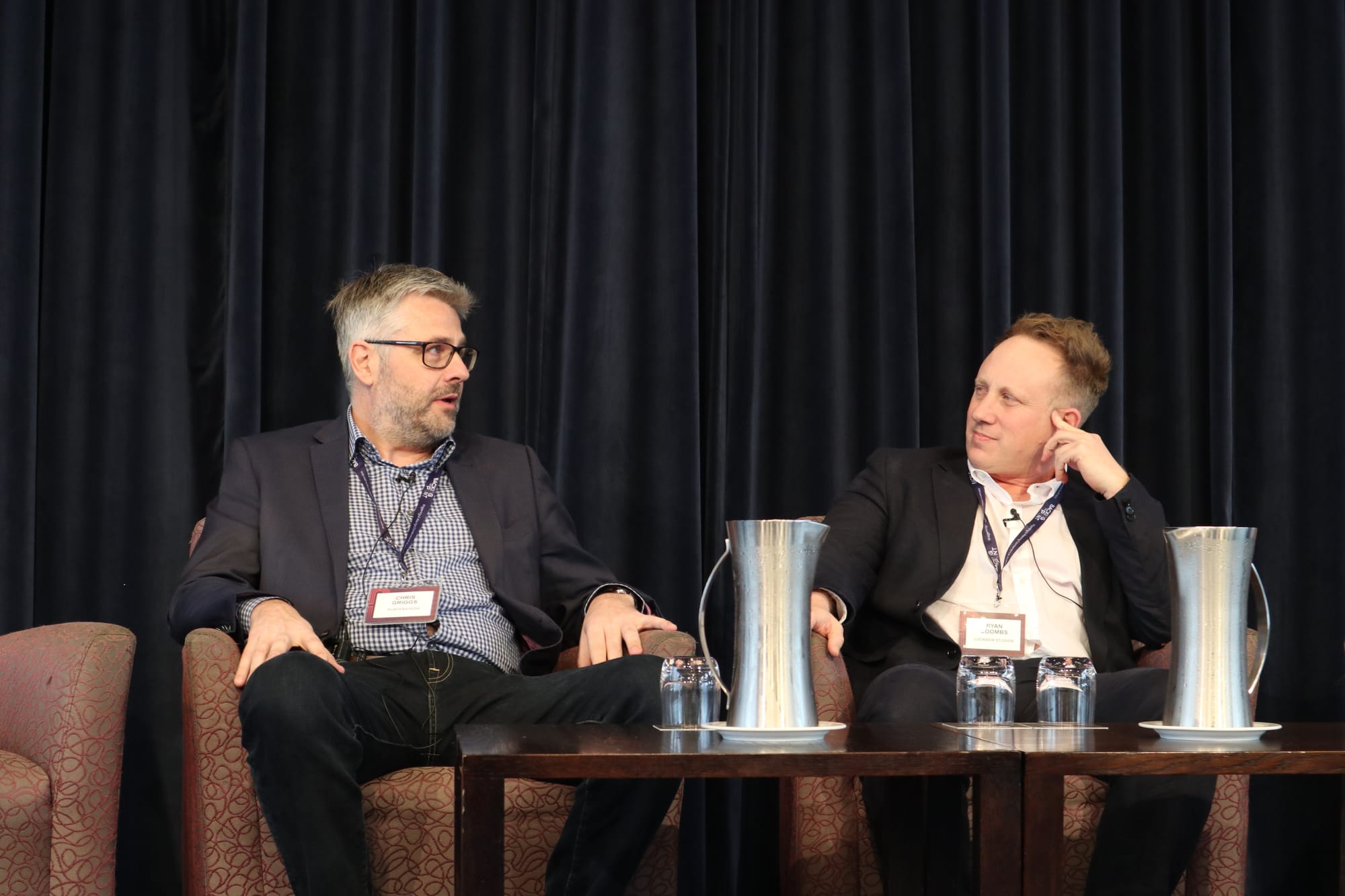After the gold rush – Punterstech sees opportunity in a wagering industry in flux
The post-pandemic wagering bubble may have burst, but wagering services provider Punterstech says the new bookmakers launched on its platform are booming. General Manager Chris Griggs chatted to Bren O’Brien about the opportunities in an industry which is more highly regulated and taxed than ever before.

Between March 2021 and March 2024, the number of online bookmakers in Australia nearly quadrupled.
The post-pandemic wagering surge created the market, and the innovation of ‘white label’ platform solutions created the opportunity for smaller bookmakers to get in on the wagering gold rush.
Brands emerged almost weekly, helped by Point Of Consumption thresholds which incentivised start-ups, powered by white label platforms such as BetMakers.
However, increased regulation (especially BetStop), taxation and a much-discussed drop in turnover has since slowed this trajectory and consolidation has become an Australian wagering industry buzzword over the past six months.
Mergers and acquisitions have become much discussed, as the big players change tack, reducing marketing and focusing on yield, while many of the smaller players look for a way to ‘get out’.
At the recent Backing the Punt wagering conference, it was reported that turnover for smaller bookmakers has plummeted 50 per cent in the space of a year.
However, despite a more chastened market, there is still considerable optimism from Punterstech’s General Manager Chris Griggs.
A one-time journalist, Griggs has been a wagering industry journeyman over the last couple of decades, working in project, product and tech management for IASBet, Sportsbet, William Hill, Crownbet and Entain as well in consultancy roles.
Punterstech, where he has worked since 2022, is a wagering solutions company. Put simply, it offers a white label base model bookmaking platform as well as a managed wagering service and a managing trading service.
The company emerged among competitors like OpenBet, BetMakers, BetCloud and GenerationWeb to offer end-to-end solutions for the smaller and/or fledgling bookmaker, lowering their barrier to entry.
The platform has just launched its 11th bookmaker, Betblitz. Of the previous 10, Griggs said nine are “booming”, defying the broader industry mood of doom and gloom.
“There’s 106 online bookmakers at the moment, and we’re forecasting at least double-digit growth next year. And we think there’s an opportunity to get a large part of that pie,” Griggs said.
“You can’t have 106 people all doing well. But it is quite amazing from our point of view, because I came from Sportsbet, Ladbrokes and William Hill. In those businesses, you are not thinking about your last dollar and how to make things work.
“But it is quite amazing that we have seen people talk about the sugar-hit, it doesn’t exist anymore. We have seen just success, a lot of success.”

It was publicly listed BetMakers that pioneered this approach at scale in Australia, driving its growth largely on a revenue share model.
According to Nick White, who has tracked the number of online bookmakers in Australia though his X account @nickwhite1995, in March 2021 there were 27, eight of them with BetMakers and six with GenerationWeb.
Twelve months later, the total online bookmakers had grown to 72, with 28 across those two platforms above. By February 2023, there were 88, of which 26 were on Betmakers, 16 on GenerationWeb and two on Betcloud.
In March this year, White reported there were 104 bookmakers, 66 of them utilising the white label solutions. Five of them were on Punterstech, 16 on GenerationWeb, 19 on Betcloud and 26 on Betmakers.
In his most recent post, White reported that the growth had slowed. In early September, there were 106 online bookmakers in action, of which 12 were new operators. Ten had become defunct, while another 16 were ready to launch ahead of the traditional spring peak season.
SEPTEMBER 2024 BOOKMAKER LIST
The first week of spring calls for an update to the long overdue bookie list.
– 12 new operators
– 16 opening soon
– 10 now defunct
106 TotalIf you notice any changes, please let me know or leave a comment. https://t.co/FYfQGtjG3A pic.twitter.com/fUcPIelZKT
— Nick White (@nickwhite1995) September 5, 2024
What had been an industry in boom, was now one in flux.
But while the growth of new bookies may have been slowed, Griggs doesn’t see a major contraction coming.
“I don’t think there’s ever going to be, like, a big collapse. There’s lots of, I mean, I’m privy to lists and things of who’s coming live. You know, there’s lots of brands coming live,” he said.
Like anyone in an ambitious and burgeoning business like Punterstech, Griggs easily slips into the sales pitch. It’s a large part of his job to continue to build clients and you can see by the number of bookies now utilising the above solutions that it is a competitive game.
But he genuinely believes the product Punterstech has developed reflects the experience of those who have developed it and offers a point of difference to its major competitors.
“It (Punterstech) was six very senior people from the industry who’ve had enough of corporate life and wanted to just do something that made sense. And they had the ability to do things on their own and control what they were doing,” he said.
“But still people forget how complex a business a platform is. It is extraordinarily difficult to write a good platform.”
The main criticism of the ‘white label’ business model is that one product tends to be very similar to the last and they can feel less than personalised.
Griggs sees this lack of distinction as a challenge, not just for that specific model but for the entire wagering industry which has pretty much worked off the same template for the better part of 15 years.
“The online sites have not changed in 20 years, really,” he said.
“It’s all menu-left, whatever. But there are other ways of doing things to make it personalised, to make it look as if the smaller bookmaker has the control that a big bookmaker has about what they’re showing.
“There’s only a handful of people in our industry who can build a platform. We’ve got most of them. And there’s only a handful of people that really understand front ends.”
“The online sites have not changed in 20 years, really. “It’s all menu-left, whatever.” – Chris Griggs
According to Griggs, the key to this lack of change is that despite the industry they operate in, bookmakers, as a rule, do not have a high appetite for risk and innovation.
“Bookmakers, not to a man, but most of them are quite reluctant to change. They’re also risk averse,” he said.
“I think in general, there’s a sort of a woe-is-me to a bookmaker anyway, because they do end up, you know, it’s an industry where you’re dealing with complaints a lot as well.”
He also points out that those operators which drove the innovation early in Australia’s corporate bookmaking revolution, the likes of Sportsbet, are now large companies who find it more difficult to be nimble in their approach.
He admits innovation is hard in an industry which is now so rigid in its structure.
“With innovation, we like to think (as an industry) we’re the bleeding edge of technology, but we’re not. Because the technology has to work. You cannot go down on Cup Day,” Griggs said.
“You cannot go down on any day. So, it has to be robust and proven. And it’s also a very difficult network of integrations with payment gateways, with feeds, with KYC (know your customer).”
So how does a business like Punterstech try to differentiate from its competitors?
A major B2B supplier industry has sprung up around corporate bookmaking in Australia, everything from payment platforms to data providers and ID verification.
Where Punterstech is looking to change that up is by bringing its own solutions to offer its clientele.
“We’re not content to just be sitting here and get to a majority of the Australian market. We’re looking at sports feeds. We’re looking at our own same-game multi-product,” he said.
“Because that’s where, if we can then say to our customers, you don’t need to use this third party because we built it for ourselves. It’s a much better story again.
“Then you go to other markets, US, UK, Europe, wherever, Africa, whatever. And you say, here’s a platform that does all these things without third parties. Even a payment gateway.
“That’s the dream. That’s where we’re heading to and then you just literally drop it in and go from there.”
“We (as an industry) like to think we’re the bleeding edge of technology, but we’re not. Because the technology has to work. You cannot go down on Cup Day.”
-Chris Griggs
Griggs said what that also allows smaller bookmakers to do is help control costs, something that is crucial in the current era of rising taxation and regulation.
“We say to people that come to us that the operational cost is going to be this, and we’re transparent. We say, in our packs, this is how much it would cost,” he said.
The flow on impact of that is, in theory, it allows smaller bookmakers to compete.
While Australia may be renowned as a land of the giants when it comes to the likes of Sportsbet, Entain or Tabcorp, these smaller bookmakers combined, do make up around 15 per cent of the market.
It means that any solution such as Punterstech, which applies across multiple bookmakers, does have the opportunity to shape the market through innovation.
“We want to be the predominant platform in Australia,” Griggs said, citing an ambition to grow to as many as 40 bookmakers in the next year.
In the local market, Griggs sees the potential arrival of Stake.com, the Australian-owned and operated global betting powerhouse which is currently not able to offer its services in this country, as another major possible disruptor.
Stake’s parent company Easygo has upped its position in PointsBet in the past 12 months, while there have been discussions about it acquiring its own local licence.

Griggs sees those types of moves as an opportunity, rather than a threat to the likes of Punterstech.
“They’re not talking to us, but they should be talking to us about a platform because genuinely our platform is as good as, if not, better than most of the other ones out there,” he said.
“And that’s not boastful. That’s just because we can benefit from what we’ve already learned, right?”
International expansion is also an important part of the future runway for development, although Griggs says the burgeoning United States market appears too difficult from a regulatory sense for smaller players to thrive.
The other opportunity for a company like Punterstech is building through acquisition. Griggs said, having built its business relatively quickly, the upside in the next 12 months is significant.
“We’re not a startup anymore. We’re a scaler,” he said.
“We’re making money and we have backers, investors, and we’ve never had to worry about money. So that’s been very helpful for us to be able to not have to do lots of investor fundraising.
“These guys that are behind us are not shy as well. So they will go to market and buy things if they think it makes commercial sense.”







